Less than 24 hours after the U.S. Embassy in Egypt told the New York Times that nothing had been decided about where President Barack Obama would deliver his “Islam speech” in Cairo next Thursday, National Security Adviser Gen. James Jones surprised nobody by confirming to a group of E.U. diplomats in Washington that the venue would be Cairo University. Two diplomats who were present said that, according to Jones, the president’s much-anticipated address reaching out to the Islamic world would call on Islam and the West to form a new partnership to confront the world’s major problems — including global […]
Middle East & North Africa Archive
Free Newsletter
For a part of the world that doesn’t have a lot of freedom, the Middle East certainly has a lot of elections that matter. On May 16, Kuwaitis elected a new parliament, sending women to the chamber for the first time. On June 7, Lebanese will go to the polls, and five days later, Iranians will have their turn. That Kuwaitis voted four women into office was a surprise even to close observers, who just a year ago had watched all of the female candidates go to defeat. As for the upcoming elections next month, handicappers expect an uneasy tie […]
I’m probably going to regret saying this, but this, from Nikolas Gvosdev’s brief post about China’s growing irritation with North Korea, brought another strategic relationship to mind: “How Beijing may reorder its strategic priorities based on how Pyongyang’s actions affect its key interests is fascinating.” Of course, I’m talking about the U.S. and Israel. (Let the wild rumpus and angry e-mails begin!) It might have had something to do with having just read Laura Rozen’s revealing piece on how deadly serious the Obama administration is about Israel freezing its West Bank settlements. There’s also this Le Monde interview with Justin […]
On a related note to the previous post about the shifting U.S.-Israel relationship, there’s been a lot discussion in France regarding the shift in France’s posture in the Israeli-Palestinian conflict under President Nicolas Sarkozy. Sarkozy has been accused of essentially adopting a pro-Israeli position that reverses France’s historic sympathy and advocacy for the Palestinian cause. I’d argue that that misses a lot of the context, and some of the finer points, of Sarkozy’s shift. To begin with, France’s historic pro-Palestinian position is no longer as necessary as it once was, for the simple reason that it has become the Western […]
Banning Garrett beat me to this topic, which had been rattling around in the cranium for the past few days, with his essay at the New Atlanticist: There is an all-too-common practice in Washington punditry ofattributing strategic intentions to other countries without anyapparent evidence. . . . Assessments of strategic intentions are critically important ininter-state relations and should be made carefully and withconsiderable evidence. The stakes in getting it right or wrong can bevery high. Garrett writes in response to a Dan Blumenthal and Robert Kagan op-ed in the Washington Post discussing China’s intentions vis à vis North Korea. But […]
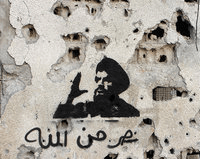
On June 7, voters in tiny Lebanon will go to the polls. On the surface, the result of the parliamentary elections might seem to make almost no difference at all. But in the peculiar Middle East laboratory that is Lebanon, the outcome of the vote will represent a barometric reading for the entire region. In the end, it may ultimately have serious repercussions that reach beyond the byzantine mechanics of Lebanese politics. Some might consider the elections inconsequential, because the two main factions of Lebanese politics have essentially agreed to grant each other veto power over major decisions. The outcome […]
Yes, well, this is no surprise, really. I’d be pretty keen on directing a major potential competitor far away from the market I’m trying to corner, too. And if I could make some money on the deal, all the better. Unfortunately, the last “I” — for India — is no longer a sure thing on the IPI “Peace” Pipeline. The stabilizing effect that would have had would have made the deal at least a palatable trade-off for losing Iranian gas for Nabucco. Now I’ve seen some reports that the Iranian gas might end up in China after transiting Pakistan. If […]

During the Cold War, U.S. military forces operated in big, firepower-heavy formations, designed to fight equally big and powerful Soviet formations — or what the Pentagon calls “peer” opponents. Times have changed, but the military hadn’t — until now. In recent months, reformers have successfully fought for sweeping changes to military force structure. The changes are meant to boost the Pentagon’s ability to fight in low-intensity, “persistent” conflicts, as opposed to the short, high-intensity major conflicts expected in the recent past. In addition to the structural changes, persistent conflicts demand new ways of thinking about — and training for — […]
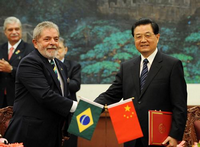
Last week was a busy one for Brazilian President Luiz Inácio Lula da Silva. In one week, the Brazilian leader visited China, Saudi Arabia, and Turkey, on a tour intended to strengthen Brazil’s diplomatic and economic ties with those three nations. The three days Lula spent in China, from May 19-21, received more attention than the other legs of the trip, in large part due to the close economic ties between the two nations. Spurred by a mutual demand for each others’ exports — with China seeking Brazilian raw materials, and Brazil seeking Chinese manufacturing — China is now the […]
You might have seen that French President Nicolas Sarkozy was in Abu Dhabi to inaugurate a French military and naval base there. (Le Figaro here, Le Monde here.) Then again, you might not have. The base, which has been in the works for the past year, is the first permanent overseas French installation not located in one of its former colonies. Also significant (to the French probably more so than to the British) is that the UAE is a former British colony, making the arrangement something of an “encroachment” on the Anglo-Saxon sphere of influence. Although the announcement last year […]
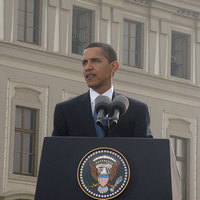
New York and Washington may be separated by only a few hundred miles, but in the last few weeks, they have appeared to be light years apart on arms control and nonproliferation issues. In New York, representatives of more than 100 countries worked from May 4-15 to prepare for next year’s nuclear Nonproliferation Treaty review conference. Buoyed by U.S. President Barack Obama’s April pledge to seek a world free from nuclear weapons, their work was marked by a spirit of cooperation and compromise that had been noticeably absent during the eight years of the Bush administration. They approved an agenda […]
I’m not sure I’d characterize the summit between the presidents of Afghanistan, Pakistan and Iran as “the latest sign of Iran’s emergence as the regional power,” as does the NY Times. I might think otherwise if Indian Prime Minister Manmohan Singh had joined them. But he didn’t, meaning this is basically the diplomatic equivalent of a block association meeting. It certainly can’t do any harm, could even do some good, and far from being an example of our inability to isolate Iran, is exactly the sort of thing that we should be — and increasingly have been — encouraging. But […]
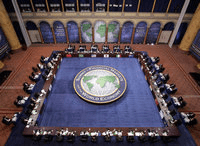
When the global financial contagion kicked in last fall, the blogosphere was quick to predict that a sharp uptick in global instability would soon follow. While we’re not out of the woods yet, it’s interesting to note just how little instability — and not yet a single war — has actually resulted from the worst global economic downturn since the Great Depression. Run a Google search for “global instability” and you’ll get 23 million hits. But when it comes to actual conflicts, the world is humming along at a level that reflects the steady decline in wars — by 60 […]
David Horovitz, writing in today’s Jerusalem Post, paints a very compelling picture of the situation that Israeli Prime Minister Netanyahu finds himself in after this week’s meeting in Washington with President Barack Obama. Horovitz points out that Obama has left Netayahu with little “wiggle room” on the settlement issue: either stop all settlements, including “natural expansion” or be cast as obstructionists. Recall that the settlement issue is like kryptonite in Israeli domestic politics, and that Netanyahu himself rode to power defying a previous generation of Israeli leaders who tried to use the settlers as pawns in a wider peace initiative. […]

Two months ago, Turkey seemed on the verge of reaching a negotiated solution to its 30-year war with the Kurdistan Workers’ Party (PKK) — a nationalist, leftist militant group based in northern Iraq and fighting for Kurdish self-determination, which has been labeled a terrorist group by the U.S. and the EU. The settlement — concocted in the corridors of power of Washington, Ankara, and Irbil — lay at the heart of U.S.-Turkish policy for a stable Iraq following the planned U.S. withdrawal in 2010. The stage was set, with Turkish President Abdullah Gül promising that “very good things” were about […]
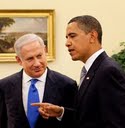
When two sides emerge from a diplomatic encounter and both of them can claim to have achieved their goals, we can consider the meeting a success. We don’t know exactly what transpired at the White House on Monday, and short of reading the minds of Israeli Prime Minister Benjamin Netanyahu or of President Barack Obama, we have no way of knowing how they truly believe their meeting went. Still, there are signs that both sides feel they achieved their objectives. As I predicted, the media focused sharply on the tension over Netanyahu’s reluctance to openly embrace the two-state solution for […]
My post on Iran’s nuclear deterrent bothered Sam Roggeveen, which usually indicates one of two things. Either, a) I need to clarify my argument; or b) I was wrong. I’ll go with option “a,” and see if that helps. The hard-line Israeli argument against an Iranian civilian nuclear program goes something like this: If Iran is allowed to master civilian nuclear technology — in particular the fuel enrichment cycle — it will eventually use that technology to arm itself with nuclear weapons. Those weapons will at worst pose an existential threat to Israel, and at best transform the strategic balance […]
